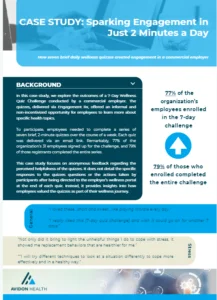Health Coach Certification Programs: Insights from Our Team
We spoke to some of our health coaches to get their firsthand experiences with various health coach certification programs. Their insights offer a starting point for those looking to understand what a health coach does and how to become one. We truly believe in the power of health coaches and leverage it throughout our entire solution due to the profound benefits of behavior change.
What Does a Health Coach Do?
A health coach empowers individuals to achieve optimal health and well-being by guiding them through lifestyle changes. Focusing on holistic wellness—including physical, mental, and emotional health—health coaches use behavior change techniques, motivational interviewing, and personalized strategies to support clients in reaching their health goals.
How to Become a Health Coach
 Embarking on a career as a health coach begins with obtaining the right credentials. Certification not only enhances your credibility but also equips you with the necessary skills to effectively support your clients.
Embarking on a career as a health coach begins with obtaining the right credentials. Certification not only enhances your credibility but also equips you with the necessary skills to effectively support your clients.
Health Coach Certification Programs Experienced by Our Team
1. Dr. Sears Wellness Institute
- NBHWC Approved:
- Basic Program: No
- Master Health Coach Certification: Yes
About the Program:
- Basic Program: Offers foundational knowledge in nutrition tailored to specific demographics like adults, seniors, or pregnant women. While convenient and customizable, this tier doesn’t qualify you to sit for the National Board for Health & Wellness Coaching (NBHWC) exam and doesn’t delve deeply into behavior change methodology.
- Master Health Coach Certification: A rigorous and thorough program that prepares you to coach confidently, providing a firm understanding of behavior change principles.
Coach’s Experience:
“The Master program is solid and definitely worth the investment. It thoroughly prepares you for real-world coaching.” — Brandy Brock
2. YogaMedCo
About the Program:
Integrates yoga, meditation, and health coaching to promote holistic wellness. Offers flexible, self-paced learning alongside structured coursework and live sessions. Emphasizes mindfulness, stress reduction, and overall wellness strategies.
Coach’s Experience:
“With a background in yoga, I found this program unique. It taught me essential coaching methodologies while enabling me to guide clients through mindfulness techniques and stress management.” — Christine Mustac
3. Rowan University – Wellness Coaching Certificate of Graduate Study
About the Program:
Consists of four graduate-level online courses covering behavior change theory, wellness coaching principles, obesity and diabetes management, and wellness across the lifespan. The final course includes practical coaching sessions.
Coach’s Experience:
“The coursework is well-rounded, providing a strong foundation in behavior change theory and wellness coaching principles. The peer discussions on Zoom were invaluable for practicing coaching techniques. While it’s more expensive due to being a university program, the connections made are worth it.” — Rachel Muniz
4. Wellcoaches
About the Program:
Often referred to as “The Gold Standard” in health coaching certification. Open to anyone with an associate degree or 4,000 hours of work experience in any field. Includes interactive, real-time classes divided into modules and can be completed in six to 18 months.
Coaches’ Experiences:
“The hybrid model of live calls and homework assignments worked well for me. The live classes allowed for skill-building through mock sessions with classmates. It’s ideal for those who are self-motivated and can manage their time effectively.” — Toby Feldman
” The flexibility suited my schedule, and the live classes were instrumental in honing my coaching skills through practice sessions with peers.” — Lindsay De Stefano
5. Holistic Wellness & Life Coach
- NBHWC Approved: No (Approved by the American Association of Drugless Practitioners – AADP)
About the Program:
Provides comprehensive training in wellness, holistic health, nutrition, and natural healing. Targets 12 dimensions of wellness combined with proprietary coaching methodologies, blending the art of coaching with psychological techniques for lasting transformation.
Coach’s Experience:
“The multi-dimensional approach was enlightening. It addresses how the brain works to help clients achieve sustainable results.” — Eileen Franco
6. KGR Health and Wellness Academy
About the Program:
A 16-week virtual program taught by three board-certified coaches. Open to anyone passionate about health coaching, it focuses on the art and science of coaching with a “Learn by Doing” philosophy. Includes live coaching sessions and extensive practice opportunities.
Coach’s Experience:
“The hands-on approach was instrumental in building my confidence and skills. The live sessions and observable coaching practices were particularly beneficial.” — Pam Faccone
7. ACE Health Coach Pro Advanced Training Program
About the Program:
Offered by the American Council on Exercise (ACE), this program includes Behavior Change Specialist Training, mentorship, and live skills assessment of recorded coaching sessions. Provides 40 hours of live sessions with one-on-one practice and feedback opportunities.
Coach’s Experience:
“As a fitness professional, this program deepened my understanding of motivational interviewing and provided live skill training and practice. The mentorship and feedback were invaluable.” — Anita Alba
8. ACE Approved YMCA Foundations of Strength and Conditioning Certification
About the Program:
Aimed at fitness professionals and exercise physiologists, this training focuses on strength and conditioning for athletes, emphasizing injury prevention. Offers specific information beneficial for those with fitness and medical backgrounds.
9. University of Delaware – Graduate Certificate in Health Coaching
About the Program:
An in-person program requiring a health-related undergraduate degree. Includes courses on chronic disease management and a practicum. Aims to develop coaching skills that help clients clarify health goals, implement sustainable behaviors, and reduce the impact of chronic conditions.
Coach’s Experience:
“The in-person classes allowed for direct interaction with instructors and peers. The practicum provided real-world coaching experience, which was crucial for my development.” — Brittany Kowalski
Why Health Coaching Matters
Health coaching plays a pivotal role in today’s wellness landscape. With chronic diseases on the rise and lifestyle factors significantly impacting health outcomes, health coaches serve as essential guides in promoting sustainable behavior change. They empower clients to take control of their health, navigate obstacles, and achieve lasting well-being.
By focusing on individualized strategies and leveraging evidence-based methodologies, health coaches can make a profound difference in the lives of their clients. The importance of health coaching extends beyond individual transformations; it contributes to healthier communities and can reduce the overall burden on healthcare systems.
Explore More NBHWC Approved Programs
While we’ve shared experiences from our team, there are numerous other NBHWC-approved programs available. To explore the full list and find a program that best fits your needs, visit the NBHWC Approved Training Programs.
Conclusion
Choosing the right health coach certification program is a pivotal step in your career. Consider factors like accreditation, curriculum focus, learning format, and how well the program aligns with your background and career goals. This list isn’t exhaustive but offers a starting point based on real experiences to help guide your decision.
If you’re part of a health coaching team looking to enhance your impact and create behavior change at scale, we’re here to support you. Explore our resources or contact us to learn how our solutions can empower your coaching efforts. By partnering with us, health coaching teams can focus on what they do best—facilitating meaningful change—while we handle the operational complexities. Together, we can amplify the impact of health coaching and drive positive health outcomes on a larger scale.









 Employees also need regular nudges and reminders. Life is busy, so don’t expect your wellness program to be a top priority for them. Give your communications a warm, caring tone – it’s important for them to know that are doing wellness for them, not to them.
Employees also need regular nudges and reminders. Life is busy, so don’t expect your wellness program to be a top priority for them. Give your communications a warm, caring tone – it’s important for them to know that are doing wellness for them, not to them.




 Embarking on a career as a health coach begins with obtaining the right credentials. Certification not only enhances your credibility but also equips you with the necessary skills to effectively support your clients.
Embarking on a career as a health coach begins with obtaining the right credentials. Certification not only enhances your credibility but also equips you with the necessary skills to effectively support your clients.







